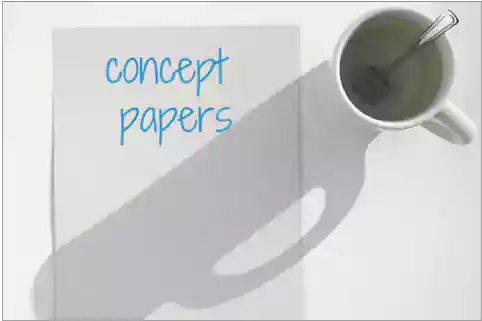
Introducing the world of concept papers, where ideas come to life and vision takes shape. You might be wondering, “Why on earth do we need concept papers?” Well, here’s the scoop: these studies are the foundation of countless successful projects, in case you’re an academic aiming to secure R&D funding, an entrepreneur with a groundbreaking business objective, or someone looking to share their innovative concepts. They serve as a roadmap for your vision, guiding it from the abstract to the actionable.
These versatile documents have their feet in both the academic and professional worlds, playing pivotal roles in proposal development, research project initiation, and business planning. And if you’ve ever pondered the question, “How can I make my ideas count?” you’ve come to the right place. In this article, we’re about to embark on a journey through the art of crafting these sheets, exploring their essence and utility.
We’ll delve into the finer details of how to structure these documents, making your goals crystal clear, persuasive, and, most importantly, actionable. So, if you’ve ever contemplated, “Who can help me write my essay for cheap?”—brace yourself because, by the end, you’ll be able to take your concepts from mere thoughts to impactful action plans.
Understanding Concept Papers

Let’s start our journey by demystifying the approach of concept papers. At its core, it is a concise document designed to articulate a novel idea or project in a way that’s both clear and compelling just like professional email writing. It’s the blueprint that transforms abstract thoughts into a structured plan of action. Think of it as the first brushstroke on the canvas of your vision.
However, it’s pivotal to note that they differ from examination proposals. While both share the goal of presenting a plan for scrutiny and potential support, they tend to be shorter and more focused. They provide an initial overview and seek to gauge interest or funding possibilities before diving deep into the research process.
Now, when might you find yourself in need of a concept paper? The answer is quite versatile. If you’re an academic seeking research funding, an entrepreneur pitching your game-changing business idea, or someone with a passion project yearning to take flight, they can be your compass. They’re often required by organizations and institutions to assess the feasibility and potential impact of your aim.
You might wonder if creating one is a petrifying chore, but fear not; by the end of this article, you’ll be well-equipped to turn your idea into a compelling concept paper. And speaking of concepts, have you ever contemplated an Academized.com review? Well, it’s time to set our sights on mastering the art of creation.
Crafting an Effective Concept Paper

Now that we’ve grasped the essence of it, let’s delve into the process of crafting an effective one. At the heart of an impactful concept paper is a clear and concise problem statement. It’s here that you articulate the issue your approach seeks to address. Be specific and well-researched, providing enough context for your audience to fully understand the problem.
Once you’ve illuminated the problem, your document should then progress to outlining the objectives. These are the beacons that pilot your journey toward a solution. What do you aim to achieve? Your objectives should be SMART: Specific, Measurable, Achievable, Relevant, and Time-bound. They ensure that your path forward is well-lit and achievable.
In addition to the objectives, it should shed light on the methodology you intend to employ. How do you plan to tackle the problem? Your approach needs to be clearly articulated and based on sound reasoning and research. It’s fundamental to show your audience that you’ve thought through the process. To further illuminate your concept, discuss the expected outcomes.
Here, you offer a glimpse of what success looks like. Paint a vivid picture, but stay grounded in reality. By addressing these elements, you’ll craft a report that’s not just a mere flicker of an idea but a radiant source of clarity and direction. Remember, effective documents light the way for your vision, just as we’ve navigated the key elements of crafting one.
Tips for Successful Concept Paper Writing

As we embark on the final leg of our journey into the world of concept papers, let’s explore some valuable tips to ensure your work shines as a guiding beacon. First and foremost, conducting a thorough analysis is the cornerstone of a well-prepared study.
It’s not just about seeking information; it’s about understanding and integrating it into your concept. Robust research will add substance and depth to your dissertation, making it all the more illuminating.
Now, we move on to the art of writing persuasively and presenting ideas logically. It should cut through the noise and convince your audience. This is where clarity and conviction are basic.
Present your objectives in a structured and compelling manner. Be confident in your narrative, as a wavering beam provides little direction. Lastly, the journey of writing is often a collaborative one. Others may spot areas where your vision isn’t as clear as you think, offering valuable suggestions for improvement.
A concept paper is not static; it evolves with each revision. In summary, by focusing on these key tips, you’ll craft the ones that serve as guiding beacons for your ideas. Now, it’s time to take this newfound knowledge and set sail on your writing journey.
Conclusion
In the ever-evolving landscape of academia and professional realms, the ability to craft a stellar document is akin to possessing a guiding beacon in the fog. As we wrap up our exploration of this topic, let’s get back to the key takeaways. Firstly, understanding the essence of it is paramount. This beacon of knowledge should illuminate the path toward achieving your goals, no matter if it’s securing funding, gaining approval, or charting a research course.
Next, we navigated through the art of crafting an effective study. Your analysis should be structured and your ideas crystal clear. A strong problem statement, well-defined objectives, a thought-out methodology, and a vision of expected outcomes are the components that will shine.
Lastly, we delved into the secrets of successful writing. Research and analysis are your anchors, grounding your paper in evidence. Writing persuasively and presenting plans logically are the strong beams that cut the fog of ambiguity. And don’t forget, seeking feedback and embracing revisions is akin to polishing your lighthouse glass. Remember, a concept paper is not a mere document; it’s a powerful tool to turn your aims into reality.
So, as you embark on your writing journey, let the knowledge you’ve gained here serve as your guiding beacon. May your thesis shine brightly, helping you navigate the challenging waters of academia and professional pursuits.
















